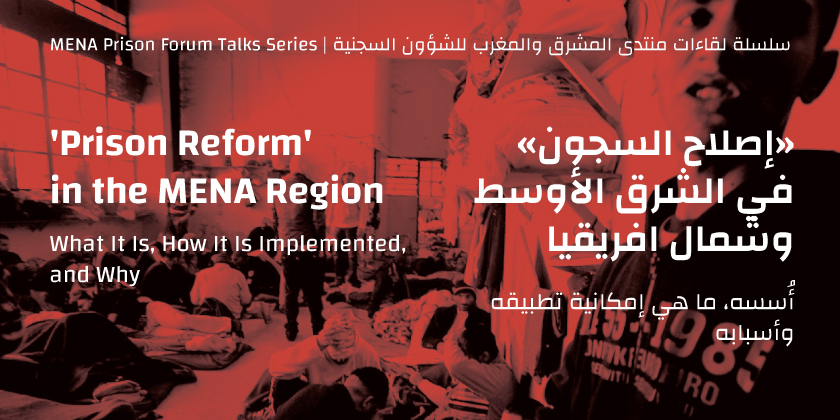
Photo: Courtesy of Haitham Moussawi
'PRISON REFORM' IN THE MENA: THEORIES AND HISTORIES
A Conversation with Kylee DiGregorio & Jad Yateem
Via Zoom
DEC 8, 2022
On December 8, 2022, The MENA Prison Forum spoke with MPF senior researcher Kylee DiGregorio about her latest MPF Observer, “‘Prison Reform’ in the Middle East and North Africa: An International Development Project and the Means to Many Ends.” This text is the first of a two-part analysis examining prison reform across the MENA region within the framework of the international development/cooperation project model. The discussion followed the structure of text which explores the historical and theoretical foundations from which donor-funded prison reform projects derive, as well as the socio-political events and shifting policy narratives from which distinct programmatic approaches have emerged.
During her talk, DiGregorio noted that in tracing these conceptual and circumstantial underpinnings, the Observer contended that prison-focused, project-driven interventions implemented throughout the region since the early 1990s have predominantly converged around three reformist agendas: (1) rule of law, (2) human rights, and (3) preventing and countering violent extremism (P/CVE). Thus, by situating these agendas within their historical context, the discussion set out to present a chronological overview of prison reform in the Middle East and North Africa. Through the juxtaposition of these agendas, the conversation likewise sought to provide insights into how each respectively defines not only ‘prison reform,’ but also ‘the prison’ itself, including the roles and functions it is designed to perform and the ends it is intended to serve.
Furthermore, DiGregorio emphasized that prison reforms in the MENA region that followed the agendas of both security and human rights approaches have shaped the strategies of international conferences, meetings, policies, and funding over the last decades. However, the ‘real-world’ implementation of reform interventions reveals a confluence of distinct agendas and priorities, which—in turn—reflect competing representations of what ‘the prison’ is and ought to be, and the roles and functions that a ‘reformed’ prison ought to fulfil. Furthermore, prisons throughout the MENA region have been integrated within international development programming with rising consistency throughout the past two decades, representing an unceasing point of focus among donors, development practitioners, and implementing agencies and organizations, as well as an array of other state and non-state stakeholders. Yet while all have been undertaken in the name of ‘reform,’ the constellation of projects carried out over the course of this period do not constitute—nor advance—one unified, monolithic agenda.
In his response to DiGregorio’s intervention, MPF spokesperson and outreach coordinator, Jad Yateem, noted how the Observer reflects the objective of the MPF in connecting prisons and carceral experiences in the MENA region to broader political systems dynamics of the ruling regimes. According to Yateem, ‘real’ reforms would not happen without independent judicial institutions that can guarantee justice and accountability. With the presence of prisons that punish political oppositions and turn blind to the crimes of rulers, any talks about prison reforms would be in vain. As a result, prison reform agendas have become more about concealments of the physical and psychological violations happening in prisons across the region than about genuine reconfiguring or improving the conditions of the detainees.
During the discussion, the participants pointed to the importance of looking into the contexts that stimulated the propositions of prison reform agendas by state and non-state actors in and outside the MENA region. For example, the calls to ‘take care’ of the detainees should be linked to the moments when Western regimes have been keen about the ‘stability’ of Arab/Middle Eastern regimes. Considering its loose meaning, such stability reflects the significance of understanding MENA prisons while examining the political, diplomatic, and financial relations between the West and the MENA countries. In this regard, Kylee DiGregorio made the disclaimer that there is this focus on visible and known detention centres when discussing the scopes and limits of reforms. Conversely, extrajudicial killings, non-state run detentions, and clandestine prisons are, for instance, other topics. Indeed, the upcoming talks of the MPF will further situate the visible and invisible aspects about the MENA prisons in global contexts to build systemic and strategic conversations out of the everyday lives and narratives of the individuals who experienced these range of conditions.
Kylee DiGregorio is a senior researcher at the MENA Prison Forum, where she writes on topics of arrest, detention, torture, enforced disappearance, and extrajudicial killing in countries throughout the Middle East and North Africa. She holds an MA in International Human Rights from the University of Denver’s Josef Korbel School of International Studies and an MA in International Affairs from Columbia University’s School of International and Public Affairs (SIPA). Prior to joining the MPF, she worked as a consultant, conducting research and producing reports for several non-governmental organizations, including Human Rights Watch and Watchlist on Children and Armed Conflict.
Jad Yateem is the MENA Prison Forum Spokesperson, and the Coordinator of MPF in Lebanon. He is a Lebanese journalist with more than 20 years of work experience in research, content creation, investigative journalism, media training, and strategic communication. He has largely worked in Lebanon and Libya, and with a special focus on Syria since the uprising in 2011.